
- Home
- Research
- Find research
- New books written by philosophers, linguists and theorists of science
New books written by philosophers, linguists and theorists of science
Do you wish to know about the books published recently, written by researchers at the Department of Philosophy, Linguistics and Theory of Science? Welcome to this page.
Concrete Particulars: A Metaphysics of Spatiotemporal Entities
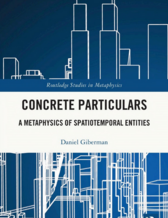
Daniel Giberman
This book presents a novel metaphysics of concrete entities. Giberman uses the theory developed to address three major topics in the metaphysics of concreta: fundamentality, persistence over time, and phenomenal consciousness.
The book provides a new theory of what “bundles” particular property instances, or tropes, into material property bearers. The theory is based on two new ideas. The first is that the primitive nature of one sui generis monadic property called markedness bears on the bundling of other properties’ tropes. The second idea is that the geometric and topological features of a given markedness trope help to determine which tropes it bundles. The author argues that this new markedness bundle theory determines all property co-instantiation at the levels of both type and token, positioning markedness tropes as the fundamental concreta. The theory also explains bundling across time, yielding an advantageous account of material persistence. Finally, markedness tropes operate as de facto panprotopsychist property instances: fundamental non-consciousness tropes that uniquely explain where and why consciousness properties are exemplified. The book solidifies the case for markedness through sustained critical analysis of competing theories of fundamentality and persistence, focusing in part on their inability to account for unending mereological and plural structures.
Concrete Particulars will appeal to scholars and advanced students working in metaphysics and philosophy of mind.
The Philosophy of Money and Finance
Editors: Joakim Sandberg and Lisa Warenski

- The first edited volume on the philosophy of money and finance
- A comprehensive introduction to the emerging field of the philosophy of money and finance
- Illustrates the philosophical questions posed by financial activity and the applicability of philosophy to challenges it presents
- Addresses questions on the nature of money, the conduct of financial institutions, the transparency of financial markets, and the fairness of political and economic systems
- An international line-up of contributors from a wide range of intellectual backgrounds
Descartes’s Moral Perfectionism
Frans Svensson
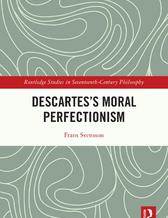
A novel and comprehensive interpretation of Descartes’s moral philosophy. In contrast to other influential interpretations, the book argues that the central tenet of his ethical thought is that each person ought to live in the way that is most conducive to their degree of overall perfection.
While Descartes’s ethical thought has attracted only a very modest amount of attention among scholars, this book demonstrates that it constitutes an important and integral component of his philosophical project as a whole. It argues that Descartes’s ethics constitutes a form of moral perfectionism. In the Cartesian picture, we satisfy this requirement of perfection by using our free will well in all our conduct, something which is also necessary for obtaining happiness for ourselves. To be guaranteed happiness, however, we need to acquire the virtue of generosity, which, besides a habit of using one’s free will well, entails a habit of being attentive in one’s thought to various truths about oneself and about the world we live in. Descartes offers an interesting attempt to make living well depend entirely on ourselves and not on fate or fortune. He also leaves room for the presence of passions within such a life and for acknowledging that even fully virtuous persons’ lives may differ in their degrees of overall perfection.
Descartes’s Moral Perfectionism will appeal to scholars and graduate students working on Descartes, the history of early modern philosophy, and the history of ethics.
Kritik av underdog-metafysiken
Johan Söderberg
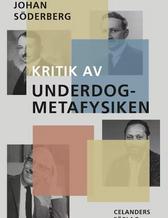
”Samhällets polarisering längs identitetspolitiska skiljelinjer stabiliserar opinionsstödet för skattesänkningar och privatiserade välfärdstjänster.”
En idéhistorisk essä som spårar källorna till kulturkriget i den offentliga debatten tillbaka till vänsterns interna uppgörelse med arbetarrörelsen och marxismen. Som ett led i denna uppgörelse orienterade sig vänstern mot identitetskamper och mångkultur. Boken analyserar idéutvecklingen inom vänstern mot bakgrund av det nyliberala systemskiftet som ägde rum vid samma tid. Av särskilt intresse för studien är hur nyliberala tänkare som Mises och Hayek har resonerat kring nationellt självbestämmande, minoritetsrättigheter och migration när de besvarat frågan hur privategendomen kan säkerställas mot ingrepp från den röstberättigade majoritetsbefolkningen.
Johan Söderberg är docent i vetenskapsteori vid institutionen för filosofi, lingvistik och vetenskapsteori på Göteborgs universitet. Han intresserar sig för kunskapens produktionsvillkor med särskild tonvikt på gränsdragningen mellan ideologi och vetenskap. Tidigare har han studerat alternativ teknikutveckling bland hackers och droganvändare. Han är biträdande redaktör för tidskriften Science as Culture.
The New Antisemitism
The Resurgence of an Ancient Hatred in the Modern World
Shalom Lappin
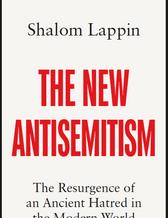
/ Release Date: June 2024/ Generations raised after the Second World War took for granted a world of stability and prosperity, and with it the waning of ancient hatreds. Recent decades have been more sobering. Instability and extremism have returned in force. As Shalom Lappin explains in this worrying book, an upsurge of antisemitism across the political spectrum has accompanied them. Recent events in the Middle East have transformed it into a tidal wave.
Lappin explores in particular the disturbing correlation between the expansion of economic globalization and the return of the anti-Jewish ideas that we thought had been consigned to the past. He examines this relationship within the context of the assault on democracy and social cohesion that anti-globalist reactions have launched in different parts of the world. To understand contemporary antisemitism, Lappin argues, it is essential to recognize the way in which its antecedents have become deeply embedded in Western and Middle Eastern cultures over millennia. This allows hostility to Jews to cross political boundaries easily, left and right, in a way that other forms of racism do not. Combatting antisemitism effectively requires a new progressive politics that addresses its root causes.
The New Antisemitism is crucial reading for anyone concerned with the social pathologies unleashed by our current economic and political discontents.
Ethical and Methodological Dilemmas
in Social Science Interventions
Careful Engagements in Healthcare, Museums, Design and
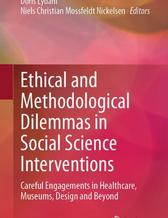
Beyond
Editors: Doris Lydahl and Niels Christian Mossfeldt Nickelsen
How researchers engage with their field and the consequences of different forms of engagement has been a long-running discussion within the social sciences and humanities. While some researchers argue that engaging and getting too close to the field of study can compromise ‘objectivity’ or ‘neutrality’, others warn that maintaining too much of a distance prevents the researcher from understanding and/or making suggestions to improve problematic or unethical conditions. This edited volume elaborates and expands on this discussion by developing an under-standing of careful engagements as a generative mode of knowledge production. In one way or another, the chapters all discuss researchers’ footwork, ambitions, and tools for engaging carefully, as well as the frictions and problems that emerge.
The idea for this book sprung out of a discussion of our common cares and concerns starting at the Society for Social Studies of Science (4S) annual meeting in New Orleans in 2019.
The Routledge Handbook of Properties
Editors: Anna-Sofia Maurin and A.R.J. Fisher
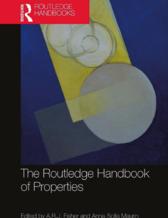
Philosophical questions regarding both the existence and nature of properties are ubiquitous in ordinary life, the sciences, and philosophical theorising. In philosophy, it is one of the oldest topics discussed in various intellectual traditions – East and West – reaching back to Plato and Aristotle. Today, in the analytic tradition, properties continue to be a core area of study and research.
The Routledge Handbook of Properties is an reference source to this perennial topic and is the first major volume of its kind. It is essential reading for anyone studying and researching metaphysics, metametaphysics, and ontology, and will also be of interest to those in closely related areas such as philosophy of science, philosophy of language, philosophy of mind, ethics, and aesthetics.
Resistance to the Current: The Dialectics of Hacking
Johan Söderberg, Maxigas

How hacking cultures drive contemporary capitalism and the future of innovation.
In Resistance to the Current, Johan Söderberg and Maxigas examine four historical case studies of hacker movements and their roles in shaping the twenty-first-century's network society. Based on decades of field work and analysis, this intervention into current debates situates an exploding variety of hacking practices within the contradictions of capitalism. Depoliticized accounts of computing cultures and collaborative production miss their core driver, write Söderberg and Maxigas: the articulation of critique and its recuperation into innovations.